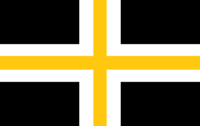Amon Lasgalens
 Flag of Amon Lasgalen | |||||||||
| Total population | |||||||||
|---|---|---|---|---|---|---|---|---|---|
| 0.2% of the Sorrenian population | |||||||||
| Regions with significant populations | |||||||||
| |||||||||
| Languages | |||||||||
| Religion | |||||||||
| Related ethnic groups | |||||||||
History
Wales
Prior to and during the Roman rule in Britain, Wales was not distinguished from what is now England.

Upon the abandonment of Britain by the Romans by 410, several independent kingdoms and tribes were formed. While England was subjected to Anglo-Saxon invasion, Britons retained control over Wales. As time progressed, Wales developed a distinct culture, more in line with ancient Celtic culture - they were influenced predominantly by Celtic Christianity, spoke Welsh and often fought with the various Anglo-Saxon Kingdoms.
Wales proudly held onto its independence from the Kingdom of England, led by legendary kings such as Llywelyn the Great. Eventually however, they were forcefully integrated into the Kingdom of England.
Welsh culture spread to Sorrenia through the influence of Llewelyn Lawton. His importance in Sorrenian politics led him to become the king of Amon Lasgalen, a subsidiary kingdom in Sorrenia originally present in Durham but eventually moved to surround Richmond in Yorkshire. His status as king began to distinguish the local Sorrenians from their northern counterparts, eventually forming the modern Amon Lasgalens.
Sorrenian Federation

The Sorrenian Federation embraced Celtic culture which helped to expand Amon Lasgalen's own culture. The Welsh language was recognised as an official language, and the King of Amon Lasgalen was granted significant powers. The area was encouraged to form its own distinct culture and identity.
Given the support of the Federation's government, calls for an independent nation were minimal, and Amon Lasgalens widely supported remaining part of the Sorrenian Federation, with retained devolved powers. Many saw the Amon Lasgalen ethnicity as a hybrid between Sorrenian and Welsh.
Kingdom of Morgannwg

Upon the collapse of the Sorrenian Federation, Llewelyn declared independence and renamed Amon Lasgalen the 'Kingdom of Morgannwg', after the medieval Welsh kingdom of the same name.
This independence was quickly abandoned however, and the new kingdom joined the Abeldane Empire. While many Amon Lasgalens supported this move, as both entities are identified by their Christianity and focus on tradition, others were concerned that Amon Lasgalen was joining a Germanic micronation with no prior historical claim to Amon Lasgalen.
Kingdom of Sorrenia
Upon the War of the Sorrenian Succession, many Amon Lasgalens supported King Ronald due to their support for conservatism and monarchy. Ronald's decision to invade Dradelia however prompted Morgannwg action, and Llewelyn invaded southern Sorrenia.
Eventually, they were defeated, and Morgannwg was forcefully reintegrated into Sorrenia, with Ronald declared King of Amon Lasgalen.
Many Amon Lasgalens opposed this, however the vast majority called for a renewed state of devolution rather than restored independence. The Lasgalen Revolutionary Front was formed to agitate for the latter, while devolutionists largely worked within the existing party framework.
Although a devolved monarchy no longer exists, Amon Lasgalen retains many elements of their devolved past which has allowed the identity to continue. Although Sorrenia is a self-declared Catholic state, the Church of Amon Lasgalen has been allowed to retain semi-official status in the county. The Welsh language also retains an official status, and many elements of Welsh culture can still be seen.
Religion

Amon Lasgalens are more religious than the national average. The Church of Amon Lasgalen is an Anglican organisation that remains popular in the county.
The de facto official status of the Amon Lasgalen Church has allowed the people to maintain religious independence, despite the move towards Catholicism throughout Sorrenia. The separation of the Amon Lasgalen Church from the Church of England has led to an inwards approach to religion, focusing on the theological history of Yorkshire, and the religious importance of sites such as Ripon Cathedral. As such, the Christianity of the Amon Lasgalens is more rustic and traditional in nature.
Saint Piran is widely seen as the patron saint of the Amon Lasgalen people, due to his historic association with Cornwall, a similarly Celtic nation.
Language
English is by far the most common language practised by Amon Lasgalens, understood by effectively 100% of the population.
Sorrenian Cumbric retains an official status in the county and is used for many official documents, although it is not widely spoken.
The Welsh language retains official status and cultural importance for many Amon Lasgalens. The language retains their link to Wales and the Celtic identity of old Sorrenia. Despite the importance for the Amon Lasgalens, only a small number actually speak and understand it.
Music
This section is empty. You can help by adding to it. |
Cuisine
This section is empty. You can help by adding to it. |
Notable People
• Llewelyn Lawton, micronational veteran, previously King of Amon Lasgalen, Morgannwg, Prime Minister of the Sorrenian Federation, among other roles. Currently Prime Minister of the Kingdom of Sorrenia, Chairman of the NDLP and Duke of Richmond
• Emrys Lawton, retired micronationalist, previously the Minister for Immigration, a member of the National Assembly of Sorrenia and prominent Amon Lasgalen figure
• Jonathan Richmond, Minister for Amon Lasgalen, Majority Leader for the Amon Lasgalen Council and prominent Amon Lasgalen nationalist and monarchist
• Richard Cunningham, Lord of Mercia and a veteran micronationalist, previously a leading opposition figure in the Sorrenian Federation, Chairman of the Commonwealth Party and an agitator for Amon Lasgalen and Sorrenian monarchy